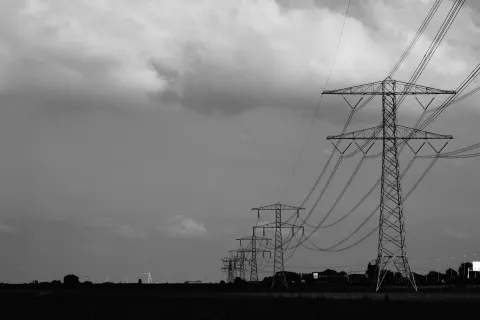
Power Outages
Power outages--sudden, unexpected losses of power--can and do happen without warning, whether due to a storm, an accident, or some other uncontrollable circumstance. In some cases, power outages may also occur as a last-resort safety measure due to extreme weather conditions that threaten the ability to safely operate the electrical grid. These are called Public Safety Power Shutoffs (PSPS).
Power outages can last anywhere from less than an hour to a day--or longer. For many people, a power outage is often times little more than a nuisance: perishable food may be spoiled, or it might not be possible to charge a laptop or cell phone.
But for someone on a restricted income, that perishable food may have been the food they had planned to eat for the entire month.
For people who rely on home health equipment such as oxygen concentrators, ventilators, motorized wheelchairs and dialysis machines, when the power goes out, consequences can potentially be severe, even life threatening.
PGE has a Medical Certificate program. However these types of programs are limited in their ability to assist individuals during power outages in that they do NOT mean that your power will be restored first in an outage, so it is critically important to have a plan and other preparations in place.
Here are some steps you can take:
Review the federal government’s Ready.gov Preparing for Power Outages page for information on preparing, surviving, and keeping safe during a power outage.
The ADA Center has created this excellent resource Emergency Power Planning for People Who Use Electricity and Battery-Dependent Assistive Technology and Medical Devices
Sign up for PublicAlerts. Signing up for these notifications allows emergency response agencies to notify you via text, call or email when an emergency in your area may require you to take action. Persons with disabilities or who may need additional assistance during an emergency or power outage are encouraged to provide additional information in PublicAlerts when they sign up. This FAQs page explains what the Additional Needs Registry does and does not do, and why it’s a good idea to share additional needs with PublicAlerts. Check out this article to read about real world examples of using these types of registries during disasters.
Other links and resources:
This FDA booklet will, upon completion, help you have an established plan to obtain and organize your medical device information, take necessary actions so that you can continue to use your device, have the necessary supplies for the operation of your device, and know where to go or what to do during a power outage.
Complex Child is a monthly online magazine written by parents of children with special healthcare needs and disabilities. Here is their article on Surviving a Power Outage with Complex Medical Issues.
Some potential hazards related to generator use are listed in this National Fire Protection Association article.
The Red Cross has a page on Power Outage Safety that includes preparing your home and what to do when an outage occurs.
Resources and information from the region’s two main electric companies:
PGE
Power out? Here’s what to do.
Prepare My Home: PGE’s checklist on how to prepare in the event of a power outage or natural disaster.
Prepare My Business: tips on how to protect your business and minimize disruptions.
Powering Medical Equipment: a page with links to resources, including a brochure.
Backup Generators: information on generator types, operations, and safety.
Get outage updates on social media via Facebook and Twitter.
Pacific Power
Outage Safety: includes tips for your home as well as generator safety.
Storm & Emergency Preparedness: information on what to include in a kit and other preparedness tips.
A link to a form to apply for bill payment assistance if a customer of Pacific Power, or a member of a customer’s household, has a medical condition that would be adversely affected if their electric service is disconnected for nonpayment of bills.
